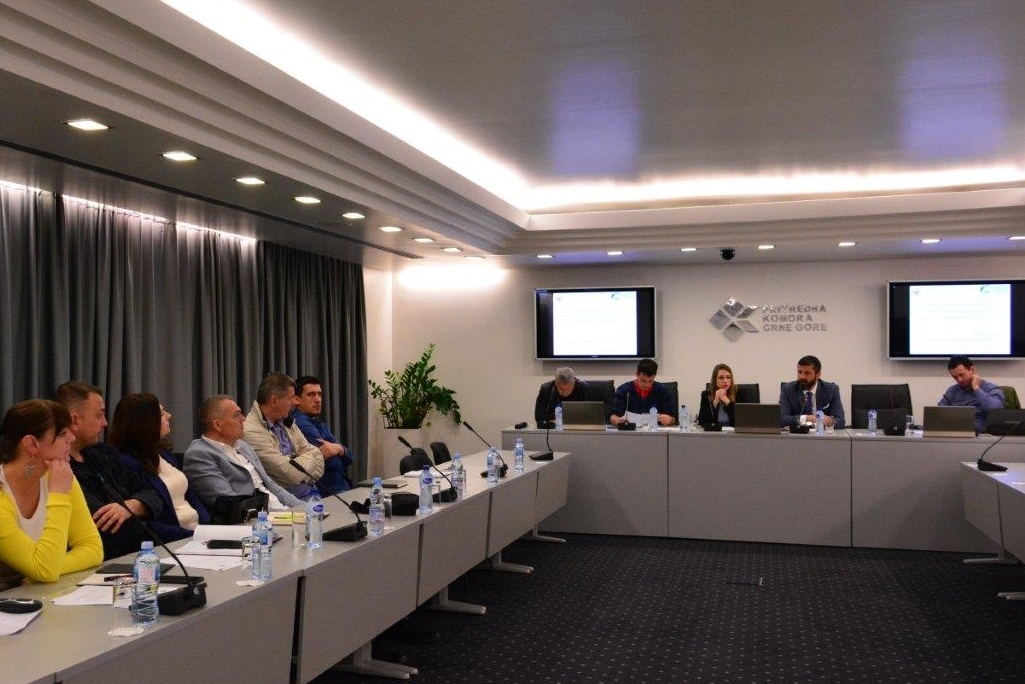On 9 May 2019, the Chamber of Economy of Montenegro and the Ministry of Economy have organized a round table “Establishment of eco design requirements for space heating and water heating devices”. The meeting was attended by the representatives of the Chamber of Economy, the Ministry of Economy, companies whose business activities are related with rulebooks which were the topic of the meeting, as well as representatives of other bodies and organizations.
In the introductory part of the meeting, Milena Rmus, Secretary of the Coordination Committee for Energy Efficiency and Environmental Protection, has informed the participants about the aim of the meeting. Rmus emphasized that the Chamber of Economy was involved in the previous period in the process of informing business sector about introduction of energy labeling requirements and eco-design of energy related products and that similar activities will be continued in the future period.
Marko Radulovic, Director-General of the Directorate for Energy and Energy Efficiency, said that the products that are the subject of the round table are widely present and he emphasized the importance of involving business sector, with the aim of quality preparation and implementation of the afore mentioned regulations. Radulovic emphasized that five regulations are expected to be adopted in June this year, and their implementation will be postponed in accordance with the requirements of the economy.
In addition, the plan is to adopt two regulations, by the end of 2019, that regulate energy efficiency labelling of devices for space and water heating. In this way, the legal framework related to placing of these products on the market will be completed – Radulović emphasized.
Bozidar Pavlovic, Head of the Department for Energy Efficiency, presented the legal framework focusing on EU requirements related to the placing on the market/put into use the energy-related products. Regarding the eco design, he explained that it is a set of conditions that must be met by an energy related product in terms of environmental protection over a period that involves the process of its manufacturing, use and disposal.
Pavlović presented in details the eco design requirements stipulated in 5 regulations in the field of HVAC engineering, which were prepared as drafts, as follows:
- Rulebook on eco-design requirements for space heaters and combination heaters;
- Rulebook on eco-design requirements for solid fuel boilers;
- Rulebook on eco design requirements for local space heater;
- Rulebook on eco design requirements for solid fuel local space heater;
- Rulebook on eco design requirements for water heaters and hot water storage tanks.
The structure of the draft rulebooks is similar and it corresponds to the structure of EU regulations. Normative part of the regulations: introduces definitions necessary for the understanding the regulations; defines the scope of implementation as well as exemptions from implementation; defines delayed implementation and phases of the introduction of certain requirements and defines the procedure of conformity assessment and verification of compliance.
In the second part of the regulation, which is prepared in the form of Annexes, specific requirements related to the eco-design of products are introduced, depending on the group of products, which can relate to:
- Requirements for seasonal energy efficiency of space heating;
- Requirements for seasonal energy efficiency of the process of water heating;
- Requirements for emissions;
- Requirements for l level of noise; and
- Product information requirements.
Short information on presented regulations is available on the following link
The drafts of the regulations are available on the link:
Presentation of regulations can be downloaded from the following link:

